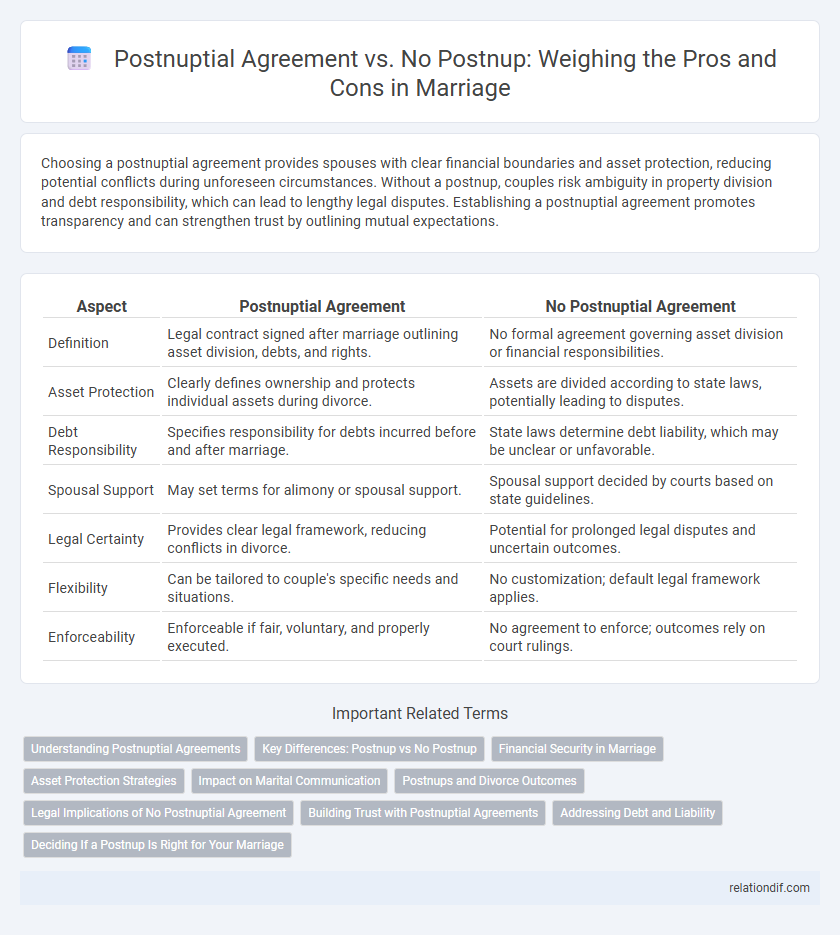Choosing a postnuptial agreement provides spouses with clear financial boundaries and asset protection, reducing potential conflicts during unforeseen circumstances. Without a postnup, couples risk ambiguity in property division and debt responsibility, which can lead to lengthy legal disputes. Establishing a postnuptial agreement promotes transparency and can strengthen trust by outlining mutual expectations.
Table of Comparison
| Aspect | Postnuptial Agreement | No Postnuptial Agreement |
|---|---|---|
| Definition | Legal contract signed after marriage outlining asset division, debts, and rights. | No formal agreement governing asset division or financial responsibilities. |
| Asset Protection | Clearly defines ownership and protects individual assets during divorce. | Assets are divided according to state laws, potentially leading to disputes. |
| Debt Responsibility | Specifies responsibility for debts incurred before and after marriage. | State laws determine debt liability, which may be unclear or unfavorable. |
| Spousal Support | May set terms for alimony or spousal support. | Spousal support decided by courts based on state guidelines. |
| Legal Certainty | Provides clear legal framework, reducing conflicts in divorce. | Potential for prolonged legal disputes and uncertain outcomes. |
| Flexibility | Can be tailored to couple's specific needs and situations. | No customization; default legal framework applies. |
| Enforceability | Enforceable if fair, voluntary, and properly executed. | No agreement to enforce; outcomes rely on court rulings. |
Understanding Postnuptial Agreements
Postnuptial agreements provide spouses with a legally binding framework to outline asset division, financial responsibilities, and debt management after marriage. Without a postnuptial agreement, couples rely on state laws or default marital property rules, which may lead to unpredictable or unfavorable outcomes during divorce or separation. Understanding the specific provisions and enforceability of postnuptial agreements helps couples protect their interests and clarify financial expectations.
Key Differences: Postnup vs No Postnup
A postnuptial agreement legally defines asset division, debt responsibilities, and spousal support in case of divorce or separation, providing clarity and reducing potential conflicts. Without a postnup, state laws govern asset distribution, often leading to increased legal disputes and uncertainty during separation. The enforceability of a postnuptial agreement offers couples a tailored framework, whereas no postnuptial arrangement relies entirely on default legal statutes.
Financial Security in Marriage
A postnuptial agreement provides clear financial security by outlining asset division and spousal support terms, reducing potential disputes if the marriage ends. Without a postnup, couples rely on state laws to determine financial obligations, which may not reflect their specific intentions or protect individual assets. Establishing a postnuptial agreement ensures tailored financial protection and transparency within the marriage.
Asset Protection Strategies
Postnuptial agreements provide a clear legal framework for asset protection by defining ownership and division of property acquired during marriage, thereby minimizing potential disputes in the event of divorce. Without a postnuptial agreement, couples rely on state laws to determine asset allocation, which can lead to unpredictable and often unfavorable outcomes. Strategically, having a postnuptial agreement enhances financial security and preserves individual wealth by customizing terms aligned with both partners' interests.
Impact on Marital Communication
A postnuptial agreement often fosters clearer communication between spouses by establishing transparent financial expectations and responsibilities, reducing misunderstandings. Without a postnup, couples may face increased conflict and uncertainty regarding asset division and financial duties, which can strain marital dialogue. Clear agreements contribute to trust and openness, enhancing overall marital communication and stability.
Postnups and Divorce Outcomes
Postnuptial agreements provide a clear framework for asset division and spousal support, significantly reducing conflicts and legal costs during divorce proceedings. Couples without postnuptial agreements often face prolonged litigation and unpredictable court rulings, increasing emotional and financial strain. Courts tend to uphold well-drafted postnuptial agreements, making them effective tools in ensuring fair and amicable divorce outcomes.
Legal Implications of No Postnuptial Agreement
Without a postnuptial agreement, couples face default state laws that govern asset division, debt responsibility, and spousal support, potentially leading to unfavorable financial outcomes during divorce or separation. Courts may interpret marital property and obligations based on legal precedents rather than personal intentions, increasing the risk of prolonged litigation and uncertainty. The absence of a postnuptial agreement can complicate estate planning and limit enforceability of specific financial arrangements between spouses.
Building Trust with Postnuptial Agreements
Postnuptial agreements establish clear financial boundaries and expectations, fostering transparency between spouses and reducing potential conflicts. Couples with postnup agreements often experience enhanced trust by openly discussing asset management and future contingencies. Opting for no postnuptial agreement may leave financial matters ambiguous, which can lead to misunderstandings and erode trust over time.
Addressing Debt and Liability
A postnuptial agreement clearly defines how debt and liabilities are allocated between spouses, protecting individual financial interests and preventing disputes. Without a postnup, debts incurred during marriage are typically considered joint liabilities under community property or equitable distribution laws. This lack of clarity can lead to significant financial entanglements and risk impacting both partners' credit and assets in case of separation or divorce.
Deciding If a Postnup Is Right for Your Marriage
Deciding if a postnuptial agreement suits your marriage involves evaluating financial transparency, asset protection, and future planning. Couples facing significant life changes such as business acquisition, inheritance, or changes in income often benefit from clearly defined terms in a postnuptial agreement. Without a postnup, couples rely on default state laws during separation or divorce, which may not align with their specific intentions or protect individual interests.
Postnuptial Agreement vs No Postnup Infographic

 relationdif.com
relationdif.com